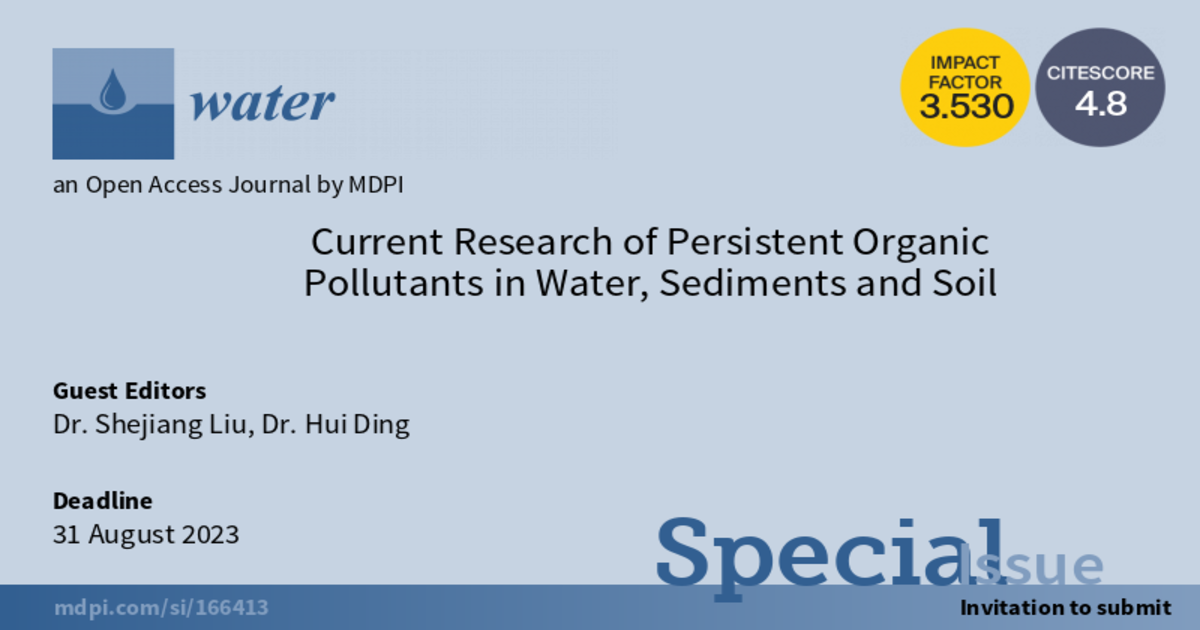- 3.0Impact Factor
- 6.0CiteScore
- 20 daysTime to First Decision
Current Research of Persistent Organic Pollutants in Water, Sediments and Soil
This special issue belongs to the section “Soil and Water“.
Special Issue Information
Dear Colleagues,
Persistent organic compounds are a kind of special pollutants existing in nature. They are serious potential hazards to the ecological environment and even human health and safety, and have become a research hotspot in the field of environment. Many studies have shown that soil, river, and lake sediments are natural reservoirs of POPs in the environment. POPs are lipophilic, easily adsorbed by the soil, and remain in the soil for a long time, making them difficult to degrade. The nature of POPs in sediments is complex and the concentration is low. Single detection methods and remediation methods do not achieve the expected results, so innovative research is urgently needed to develop methods with higher detection efficiency and better remediation results. Overall, the aim of this Special Issue is to bring together original research and review articles that discuss the study of Persistent Organic Pollutants in Sediments and Soil, as well as to share new progress.
Potential topics include but are not limited to the following:
- New strategies to improve the remediation of POPs in sediments and soils.
- Develop POPs detection techniques with wider applicability, lower detection limits and higher sensitivity.
- Study the optimal removal methods for different types of POPs.
- Explore the synergistic effects between different treatment methods.
- Mechanisms of transport and transformation of POPs in sediments and soils.
Looking forward to receiving your contributions.
Dr. Shejiang Liu
Dr. Hui Ding
Guest Editors
Manuscript Submission Information
Manuscripts should be submitted online at www.mdpi.com by registering and logging in to this website. Once you are registered, click here to go to the submission form. Manuscripts can be submitted until the deadline. All submissions that pass pre-check are peer-reviewed. Accepted papers will be published continuously in the journal (as soon as accepted) and will be listed together on the special issue website. Research articles, review articles as well as short communications are invited. For planned papers, a title and short abstract (about 250 words) can be sent to the Editorial Office for assessment.
Submitted manuscripts should not have been published previously, nor be under consideration for publication elsewhere (except conference proceedings papers). All manuscripts are thoroughly refereed through a single-blind peer-review process. A guide for authors and other relevant information for submission of manuscripts is available on the Instructions for Authors page. Water is an international peer-reviewed open access semimonthly journal published by MDPI.
Please visit the Instructions for Authors page before submitting a manuscript. The Article Processing Charge (APC) for publication in this open access journal is 2600 CHF (Swiss Francs). Submitted papers should be well formatted and use good English. Authors may use MDPI's English editing service prior to publication or during author revisions.
Keywords
- water-sediment
- persistent organic pollutants
- detection
- health risk assessment
- photocatalysis
- adsorption
- biodegradation

Benefits of Publishing in a Special Issue
- Ease of navigation: Grouping papers by topic helps scholars navigate broad scope journals more efficiently.
- Greater discoverability: Special Issues support the reach and impact of scientific research. Articles in Special Issues are more discoverable and cited more frequently.
- Expansion of research network: Special Issues facilitate connections among authors, fostering scientific collaborations.
- External promotion: Articles in Special Issues are often promoted through the journal's social media, increasing their visibility.
- e-Book format: Special Issues with more than 10 articles can be published as dedicated e-books, ensuring wide and rapid dissemination.

